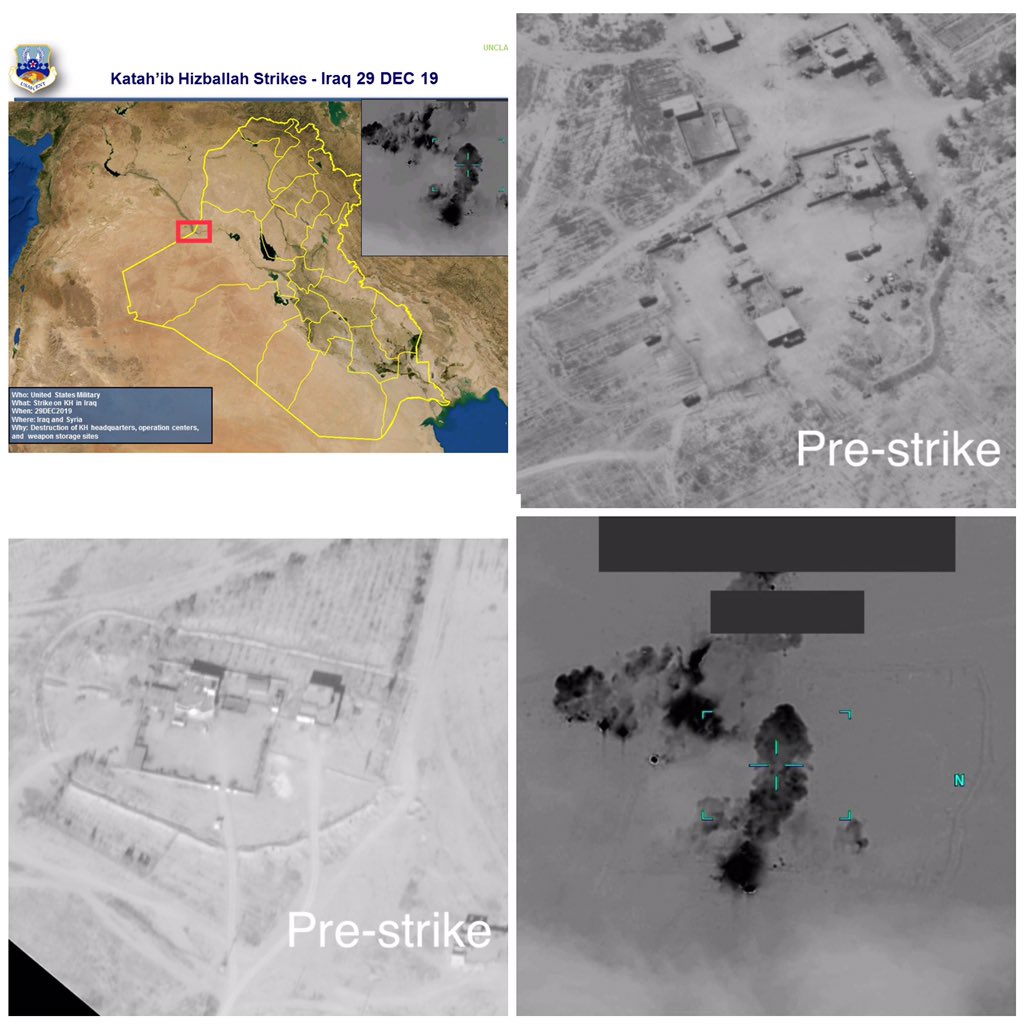American warplanes struck five separate facilities in Iraq and Syria on December 29th, 2019 in retaliation to a rocket attack on Iraq’s K-1 base near Kirkuk where several U.S. personnel were wounded and an American contractor was killed. The strikes, which occurred roughly 48 hours after the rocket attack, targeted Kata’ib Hezbollah, a militant group that has a long history of fighting U.S. forces in the region and one that is directly supported by Iran and its Quds Force. Tensions are already extremely high between the U.S. and Iran. After these somewhat unprecedented airstrikes, it can be argued that the possibility of a larger outbreak in violence between the two bitter foes has increased markedly.
A statement from Pentagon about the strikes reads as follows:
In response to repeated Kata’ib Hizbollah (KH) attacks on Iraqi bases that host Operation Inherent Resolve (OIR) coalition forces, U.S. forces have conducted precision defensive strikes against five KH facilities in Iraq and Syria that will degrade KH’s ability to conduct future attacks against OIR coalition forces.
The five targets include three KH locations in Iraq and two in Syria. These locations included weapon storage facilities and command and control locations that KH uses to plan and execute attacks on OIR coalition forces.
Recent KH strikes included a 30-plus rocket attack on an Iraqi base near Kirkuk that resulted in the death of a U.S. citizen and injured four U.S. service members and two members of the Iraqi Security Forces (ISF).
KH has a strong linkage with Iran’s Quds Force and has repeatedly received lethal aid and other support from Iran that it has used to attack OIR coalition forces.
The OIR coalition is in Iraq at the invitation of the Iraqi government to ensure the lasting defeat of ISIS and provide advice and assistance to the ISF. The U.S. and its coalition partners fully respect Iraqi sovereignty, and support a strong and independent Iraq. The U.S., however, will not be deterred from exercising its right of self-defense.
It is important to note that KH attacks have also injured multiple members of the ISF. Secretary Esper and Prime Minister Mahdi have shared with each other their commitment to see these KH attacks on ISF and OIR forces cease once and for all.
Iran and their KH proxy forces must cease their attacks on U.S. and coalition forces, and respect Iraq’s sovereignty, to prevent additional defensive actions by U.S. forces.
Concern over Iran’s increasingly powerful proxies in Iraq has hung over U.S. relations with the country for years, but in recent months, those concerns have elevated to the point of kinetic action. Israel has been running a limited and clandestine air campaign over Iraq that began earlier this year and has focused on striking potentially stockpiles of advanced weapons in the hands of Iranian proxies. Meanwhile, the U.S. has repeatedly warned of intelligence indicating these groups may step up attacks on U.S. interests in Iraq and throughout the region. This supposed change in the intelligence stream prompted major increases in U.S. military might in the Middle East late last Spring. This hardened posture was enhanced further after an unprecedented drone and cruise missile strike at the heart of Saudi Arabia’s oil production capabilities last September.
Now, with the U.S. turning its stance from one of force protection to kinetic actions against these threats, we will have to wait to see how Iran—which has deeply rooted power in the Iraqi government—will respond. In addition, it is unclear if the Iraqi government approved these strikes. If they did not, the act could create another deep wedge between Baghdad and Washington D.C., one that Iran could further capitalize on.
We are also tracking some peculiar aircraft movement which may or may not be related to this flare-up of hostilities in the region. Moving more capabilities into Central Command’s area of responsibility would make sense following these unprecedented strikes.
UPDATE: 3:33pm PST—
The situation is changing rapidly in Iraq in the hours following the U.S. strikes on Kata’ib Hezbollah in Iraq and Syria.
There are reports of another rocket attack on a base housing U.S. personnel Iraq:
Casualty reports from the strikes are wide-ranging, but all include multiple killed and wounded. Key individuals tied to the group and Iran’s Quds forces are vowing revenge:
The Iraqi government appears to have not given its approval for the strikes, which could result in a huge division between the Washington and Baghdad in the hours and days ahead:

Multiple reports on social media of a large blast heard in Baghdad’s Green Zone and an increased U.S. military presence there, but these cannot be confirmed at this time.
President Trump is meeting with top foreign policy and defense officials at Mar-a-Lago following the strikes:
UPDATE: 4:35pm PST—
As predicted above, a real rift is emerging here. Iran will do anything it can to capitalize on it and further its influence, both military and political, in Iraq:
Once again, the situation remains fluid and some of these details are bound to be revised in the hours to come.
We will update this post as this developing story continues to unfold.
Contact the author: Tyler@thedrive.com
